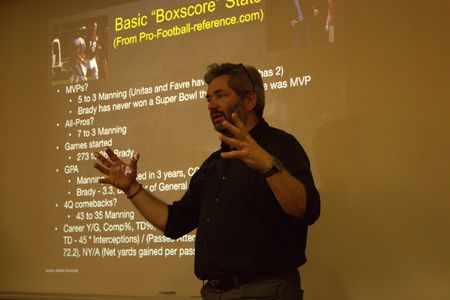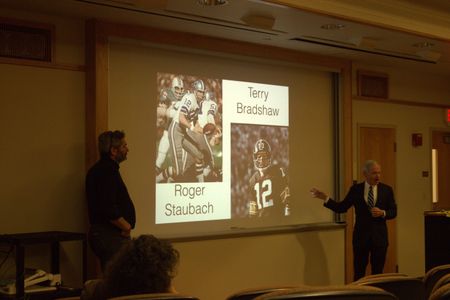Brady vs. Manning: CGS professors crown a winner
Two College of General Studies professors addressed the question of whether Tom Brady or Peyton Manning is the better quarterback during a BU Friends and Family Weekend Event on Oct. 19.
In “The National Football League Rivalry that Captivated America: Brady v. Manning,” Associate Professor Thomas Whalen and Senior Lecturer Andy Andres discussed NFL culture, the history of sports rivalries, and whether the distinction of who is the dominant quarterback should be dependent on statistics or wins.
As an analyst, Andres favored using statistics to make the determination.
“At the end of the day, Manning has more comebacks, passing touchdowns, passing completions, and more All Pros than Brady ever has—that’s just the numbers,” Andres said.

Andres argued that Manning was the superior quarterback, while acknowledging the largely pro-New England crowd.
“My friends, my colleagues and everyone gets mad at me, but you guys look like a nice crowd, so I hope you hear me out,” he said.
Using numbers from Pro-Football-reference.com to make his case, Andres argued for Manning’s superiority.
“In the NFL, winning is complex in the statistics versus wins debate. Obviously the quarterback matters [for a win], but to what degree? There are other factors involved than just the best QB. It’s safe to say that a win is a complex enterprise,” he said.
However, Andres admitted that it is normal to consider wins as the standard for these debates.
“The fundamental idea is that is these debates, we default to wins. But, we have to remember it’s more complex than that. You have to look at the numbers,” said Andres.
To get the audience to understand his belief, Andres offered a rhetorical example.
“Based on the statistics, imagine if Brady played for Tony Dungy, Jim Caldwell, John Fox, and Gary Kubiak. Do you think [Brady] would have the same level of wins?” asked Andres.
Whalen pointed out how Brady has only stayed with one coach his whole career, a fact that Andres used to further his point.
“Manning went to four coaches and went to four Super Bowls. That’s a huge change in [Manning’s] dynamic yet he still won,” said Andres.
Ultimately, the panelists concluded that Manning won the matchup.
“Brady has talent, but statistics wise, Manning wins,” Andres said.
In addition to the debate over which quarterback is superior, Whalen and Andres examined other notable aspects of the quarterback’s role in the game, and the historical precedents for the Brady vs. Manning rivalry.
Using examples such as “The Rumble in the Jungle,” one of Muhammad Ali’s best known fights against boxer Joe Frazier, Whalen highlighted why this duel captivated the world’s attention.
“Americans tend to gravitate toward sports that reflect what is happening in our broader society,” said Whalen.

To back up this claim, Whalen brought up the historical context of both Brady and Manning’s careers.
“Brady and Manning reached the top at a time when the world was changing rapidly. We had [just experienced] 9/11. It was the beginning of endless wars in the Middle East, and football reflected that aggression,” said Whalen.
In fact, he notes how Brady led the New England Patriots to their first Super Bowl victory against the St. Louis Rams in 2001, just months after the 9/11 attacks. It brought a sense of camaraderie and patriotism, he said, that reflected what society was feeling at the time.
Andres also discussed why and how the quarterback became such an integral part of the sport’s culture.
Andres said, “The NFL realized that the quarterbacks are the stars of the show. They knew they had to protect them at all costs.”
—By Kirthana Iyer